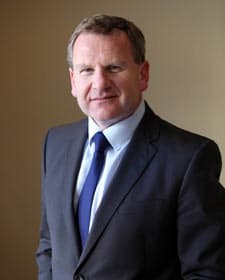There is real substance behind Ireland’s economic success, believes Ibec CEO Danny McCoy.
The old adage says that business hates uncertainty, yet business appears strong in the marketplaces of both the UK and US – the very epicentres of the uncertainty generated by Brexit and the inauguration of Donald Trump.
High stock market valuations, strong sentiment indicators, low long-term interest rates and impressively low unemployment rates seem to belie the uncertainty narrative. One country that offers an associated perspective on these uncertainties is Ireland.
Ireland set out its stall over 60 years ago with a blueprint, devised by the visionary public servant and economist TK Whitaker. At this time, the country sought to move from a protectionist economy to an open one, and to attract inward investment.
Ireland’s track record was mixed for half of the intervening period, but several factors combined subsequently to catapult the country from a small regional economy with low economic activity, to one that provides some of the world’s highest living standards.
Central to this was the rise of globalisation since the late 1980s; the completion of the EU Single Market; and the re-emergence of the world Anglo-Saxon corporate hegemony; along with Ireland’s own low corporate tax rate and its young well-educated English-speaking workforce.
The intervening global financial crisis hit Ireland hard, but the perception that Ireland had – like Icarus – flown too high, has been challenged by the strength of its subsequent recovery. The level of output is now beyond that of the Celtic Tiger era, debt ratios are plummeting, and a huge balance of payments surplus has emerged – all indicative of a vibrant business model.
As a consequence, Ireland has been viewed for the best part of two decades as being one of the most globalised and trade-dependent countries.
STRONG MODELS

Danny McCoy
Our business model is multi-faceted. It’s not just about our low corporate tax rate; it’s also about our well-educated workforce, our entrepreneurial culture, our outward looking approach, and our business-friendly environment.
As a small open economy of just under 5 million people, the Irish connectedness to the bigger stories unfolding in the latter half of 2016 is best captured by three measures: US direct investment stock in Ireland is larger than US investment in the BRIC countries combined; Ireland is the UK’s third-largest trading partner; and in the year 2015, Ireland’s economy grew by an impressive 6%.
But surely the Irish business model is threatened by the uncertainty brought about by Brexit and Trump? Shouldn’t it be the case that the withdrawal of our largest co-joined trade partner from the EU will be bad for Ireland?
Add in the prospect of both the US and the UK pushing their corporate tax rates towards the Irish established 12.5% rate, and there must be trouble ahead.
In a world where substance will matter, Ireland and its businesses are well poised for the challenges ahead
While these are very substantial threats, Ireland’s commitment to remain fully within a post-Brexit EU will provide countervailing opportunities. These remain in the category of ‘known unknowns’. However, there is one crucial ‘known known’ for Ireland, and that is the OECD G20 corporate taxation process.
The OECD process has established that tax policy must be matched by substance. Ireland with its established decades-long track record for corporate investment, and its common law legal structures, has strong advantages for attracting such corporate balance sheet migration.
Ireland has indeed experienced a cascade of such corporate substance in the last three years. There has been a consequent flow of output pushing Ireland’s GDP levels so high that they attracted scepticism, both internationally and domestically.
Indeed, it is worth noting that the UK has been Ireland’s biggest rival for corporate migration. Post-Brexit, this will become a rivalry between the UK and the EU as represented by Ireland.
Ireland is possibly the best example of EU success for a small open economy. Many reasons are credited for this success, with substance being an important, but underrated, component.
Yet substance is precisely what Ireland has built up over the last quarter century. Our outward direct investment has matched our inward direct investment; Irish corporations now employ more people in the US than US firms employ in Ireland. Irish household net wealth is the second highest in the EU. Our population has increased by 30% in a generation.
In a world where substance will matter, Ireland and its businesses are well poised for the challenges ahead.







